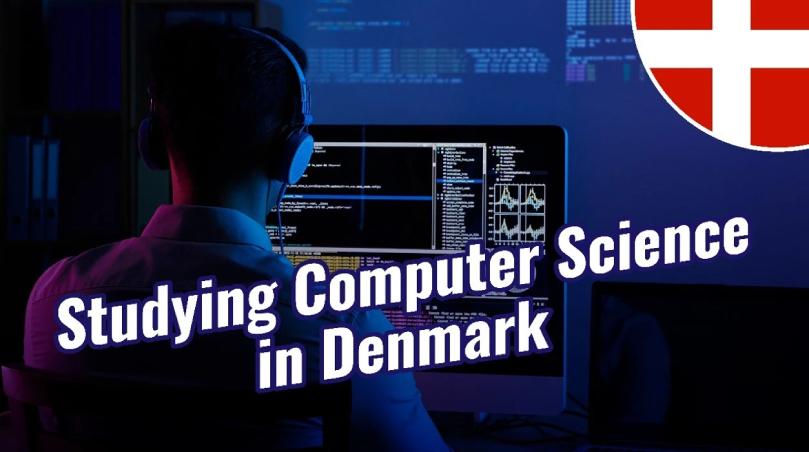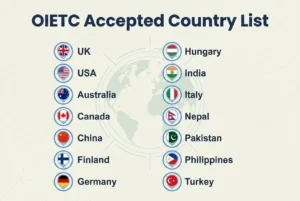Looking to study Computer Science in Denmark? Denmark, a nation synonymous with picturesque landscapes and a rich cultural heritage, has emerged as a powerhouse in the global tech landscape. As we stand on the brink of a digital revolution, the decision to study Computer Science in Denmark is not just about academic pursuits; it’s a strategic move toward a future shaped by technological innovation. This guidance will help you to look deeper into the opportunities for studying in Denmark for Computer Science. So, let’s discuss it.
Why Study Computer Science in Denmark?
Denmark has emerged as a prominent hub for higher education, particularly in the field of Computer Science. Here are the reasons why you should study Computer Science in Denmark.
Academic Excellence
Denmark boasts internationally acclaimed universities recognized for their excellence in Computer Science education. Institutions like the University of Copenhagen, Aarhus University, and the Technical University of Denmark (DTU) offer comprehensive programs taught by esteemed faculty members.
Innovative Curriculum
The curriculum emphasizes a balance between theoretical learning and practical applications. Students often explore various areas like algorithms, software development, machine learning, and cybersecurity, aligning education with industry demands.
Research Opportunities
Denmark fosters a research-oriented environment, allowing students to engage in groundbreaking research projects alongside professors, contributing to technological advancements.
Global Networking
Studying in Denmark offers a diverse and inclusive environment, fostering connections with peers from across the globe, enriching the learning experience, and expanding professional networks.
Career Prospects
Graduates of Computer Science programs in Denmark are highly sought after by multinational corporations and tech giants due to the quality of education and practical skills acquired during their studies.
Diversity and Inclusivity
Studying computer science in Denmark isn’t just about learning algorithms and programming languages; it’s about immersing yourself in a diverse and inclusive community. English-taught programs attract students from around the world, creating a melting pot of cultures, perspectives, and ideas. This diversity enriches the educational experience, preparing students for a globalized tech industry.
Popular universities to study in Denmark for Computer Science
Denmark is home to several prestigious universities renowned for their excellent Computer Science programs. Each of those universities has its unique strengths, teaching methodologies, and research focuses. Here are some popular universities to study in Denmark for Computer Science:
- University of Copenhagen (UCPH)
- Technical University of Denmark (DTU)
- Aarhus University
- Aalborg University
- IT University of Copenhagen
- Roskilde University
Popular Computer Science Programs in Denmark
Denmark offers a range of popular Computer Science programs across various universities, each with its unique focus areas and specializations. Here are some of the best programs to study in Denmark for Computer Science :
- Bachelor of Science in Computer Science
- Master of Science in Computer Science
- Data Science and Big Data Analytics Programs
- Software Engineering Programs
- Cybersecurity and Information Technology Programs
- Artificial Intelligence and Machine Learning Programs
- Computer Games and Interactive Technologies Programs
Entry requirements to study in Denmark for Computer Science
Entry requirements for studying Computer Science in Denmark may vary slightly among universities and programs. However, here are the general entry requirements to study in Denmark for Computer Science.
Academic requirements
For Bachelor’s Programs
Applicants need a recognized secondary education certificate or equivalent qualification.
Specific subject requirements might include mathematics and/or physics.
For Master’s Programs
A relevant bachelor’s degree in Computer Science or a closely related field is typically required.
Some universities may consider applicants with degrees in other disciplines but with relevant coursework or experience.
English requirements
Proof of English proficiency is required through tests like IELTS, TOEFL, or equivalent. The minimum IELTS requirement for international students is 6.5. Some courses may require an overall 7.0 from international students.
Cost to study in Denmark for Computer Science
The cost to study in Denmark for Computer Science for international students includes tuition fees, living expenses, and various other factors. Here’s a breakdown of the cost to study in Denmark for Computer Science.
Tuition Fees
Many universities in Denmark offer tuition-free education for students from the EU/EEA/Switzerland. However, certain programs might have fees or additional costs, especially for specialized or executive programs. Tuition fees for international students vary between universities and programs. On average, tuition fees for Bachelor’s programs range from €8,000 to €15,000 per year. Master’s programs can range from €8,000 to €22,000 per year.
Living Expenses
The cost of accommodation in Denmark varies based on location and type. On average, students spend between €300 to €700 per month on rent for a shared apartment or student dormitory.
Admission process to study Computer Science in Denmark
The admission process to study in Denmark for Computer Science typically involves several steps. While the specifics might vary among universities and programs, here’s a general overview of the entire admission process to study in Denmark for Computer Science.
Research and Choose Programs
Explore the universities and programs offering Computer Science or related degrees in Denmark. Consider factors like program curriculum, specializations, faculty, and university reputation.
Check Admission Requirements
Review the specific admission criteria outlined by the university for the Computer Science program you’re interested in. Ensure you meet the academic requirements, language proficiency, and any other requirements.
Prepare Application Documents
Gather necessary documents such as transcripts, diplomas, and certificates showcasing your academic qualifications. Prepare proof of English proficiency (IELTS, TOEFL, or equivalent).
If required, prepare additional documents like a CV, letters of recommendation, or a statement of purpose.
Apply Online
Most Danish universities have online application portals. Create an account and complete the application form. Submit all required documents within the deadline.
Pay Application Fees
Some universities may have application fees for international students. Ensure payment is made within the application deadline.
Await Admission Decision
After submitting your application, wait for the university’s admission decision. Check the university website or your email regularly for updates.
Acceptance and Enrollment
If accepted, follow the instructions provided by the university to confirm your acceptance and secure your spot. Complete any additional requirements for enrollment, such as paying tuition fees or obtaining a residence permit.
Visa Application (for Non-EU/EEA/Swiss Students)
Non-EU/EEA/Swiss students may need to apply for a student visa or residence permit after receiving the acceptance letter. Apply for the visa within the specified timeframe, providing the necessary documents and meeting the requirements set by the Danish authorities.
Final words
Embarking on a journey to study in Denmark for Computer Science opens doors to unparalleled opportunities for academic growth, professional development, and personal enrichment. With its progressive education system, emphasis on research, and global outlook, Denmark stands as an ideal destination for aspiring computer scientists looking to make a mark in the tech industry. If you want to study Computer Science in Denmark, you can always contact AIMS Education.





